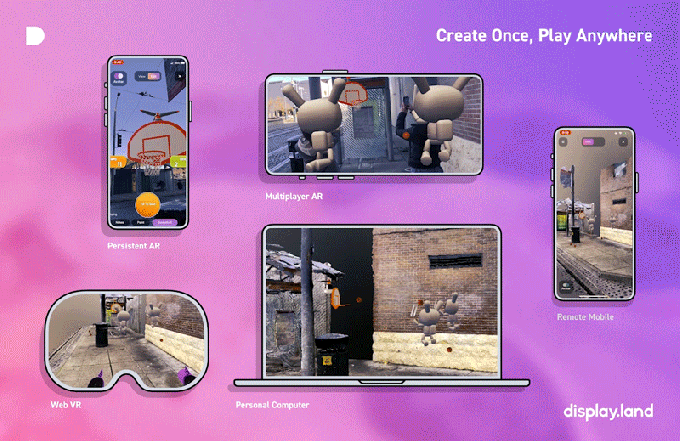Ubiquity6 launches a studio editor built for the real-world
“The time is over for Unity,” Ubiquity6 CEO Anjney Mdiha says. “It’s just not the future.”
Even though 2019 was a rough year for augmented reality startups, Ubiquity6 remains ambitious as one of the better-capitalized players in the space. In 2018, the startup closed $27 million from Benchmark and Index Ventures; they’ve raised $37.5 million in total. The company, which now has 65 employees, has been operating largely in secret for the past two-and-a-half years, promising the eventual release of a web browser built for augmented reality.
After a couple of public demos, including a showing at SFMOMA, Ubiquity6 released their app Display.land in public beta last month. The app enables users to walk through and capture 3D space with their phone cameras.
The company’s big announcement today puts that release in greater context; they’re building a level editor of sorts that can help developers and the technically curious turn their scans into small games or 3D scenes that mix the digital and real. Ubiquity6 is opening early access sign-ups for the studio editor today.
Ubiquity6 wants to seize on some of the consumer interest in real-time editors built for titles like Fortnite and Roblox that have become a hit with modders. Combining that kind of user experience with the niche of real-world capture that appeals to AR/VR junkies, the company is hoping they can bring aboard a community that understands what their platform could enable.

Display.land may be built with the phone in mind, but Ubiquity6 hopes that the startup’s phone app will be a means to an end for creators capturing and designing 3D content that can be viewed on multiple platforms via the web. I demoed the company’s platform on mobile, desktop and VR, something that just required clicking a link. The app still feels quite experimental and there’s a non-trivial learning curve to capturing environments that won’t turn out as a gargled 3D mess.
“The thing about this age of creativity is that you never know what’s good enough,” Midha tells TechCrunch in an interview. “It will not work in 100% of examples, but ‘good enough’ really only comes from giving it to a large number of users and seeing where they find it useful.”
The startup’s product is in its early stages while engines like Unity are behemoths built for plenty of use cases. As Unity optimizes for professional use cases beyond gaming, it’s too complex and time-intensive to keep up with developers, Midha argues. Over time, he says, the company’s platform will pick up more general purpose functionality to appease developers that are interested in elements of this new offering but desire more base level features to compete with existing engines.
While other AR startups have drifted away from consumers to find more receptive enterprise customers, Midha feels that the consumer opportunity hasn’t been tapped. “I think the vision has always been consumer,” he says. “If you believe and have conviction in the space, it’s unfair to compromise on that vision.
No comments
Note: Only a member of this blog may post a comment.